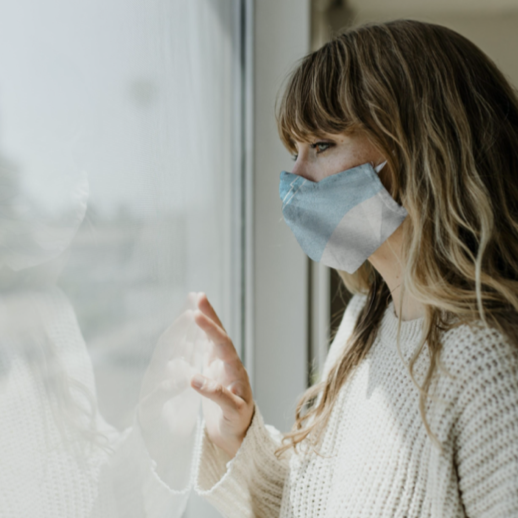Allison Tice, David Casson, Kelsey Markel, and Sydney Brenner (Advisor: Dr. Danielle Findley-Van Nostrand)

During the middle of a global pandemic, one cannot help but wonder about the implications of social isolation and loneliness on emotion regulation. Emotion regulation is the ability to control one’s emotional expression or outlook on a specific situation. As a group, we are interested in this topic after further investigating prior research that discusses the impact of social isolation and loneliness on emotion regulation strategies. Specifically, we looked at the emotion regulation strategies cognitive reappraisal and expressive suppression. Cognitive reappraisal is the ability to change the way an individual can perceive a situation and change their emotions. Expressive suppression is the change in visible emotional state or the ability to change the way one feels about an emotion. For example, someone who is feeling angry might attempt to disguise their anger and display themselves in a happy or content state. We assessed these two strategies to see if cognitive reappraisal or expressive suppression was more prevalent in individuals. As a group, we were also very interested to see if there were any gender differences between emotional regulation strategies.
To see any valid relationships between loneliness. social isolation, and emotion regulation, our research team created a survey through software called Qualtrics. In our study, we had 102 total participants who completed the survey. The participants are all Roanoke College students, and many of them are either taking a PSYC-101 or INQ-260 class. The questionnaire consisted of forty-one questions. At the beginning of the survey, we included questions asking about participant’s demographic information and participants’ experiences with COVID-19. The remaining thirty-six questions were taken from three different scales. The University of Los Angeles Loneliness Scale measured participants’ levels of loneliness (Russell, 1996), the Lubben Social Network Scale measured levels of social isolation in participants (“Version of the LSNS”, 2021), and the Emotion Regulation Questionnaire, measured levels of participants’ emotion regulation strategies, specifically expressive suppression and cognitive reappraisal (John & Gross, 2004). Using these evidence-supported scales allowed us to study any possible associations between social isolation, loneliness, and emotional regulation strategies.
We predicted that with an increase in social isolation and loneliness, one’s ability to regulate their own emotions using either cognitive reappraisal or expressive suppression will be potentially more challenging because difficulties such as feelings of loneliness could be suppressed through expressive suppression which has shown to increase sensitivity regarding the intensity of the emotion exhibited. On the other hand, the negative feelings could also be curbed through cognitive reappraisal which has shown to have benefits associated with positive emotional outcomes as a regulation strategy. We were correct in expecting a higher level of difficulty regulating emotions, as more individuals who had less interaction with family and friends were likely to feel more lonely in general. Expressive suppression is moderately correlated with feelings of loneliness, which indicates that those who experienced the feeling of loneliness were more likely to suppress their emotions. Our hypothesis also suggested that our COVID-19 survey questions would play a role in our results, as well. The analysis of these questions indicates that a negative impact from COVID-19 is associated with higher levels of loneliness. Specifically, regulating emotions can be harder when feelings of loneliness and social isolation are present. Our results also show that the expressive suppression of negative emotions can be utilized to prevent exhibiting negative feelings, even though this method may not be mentally sound or healthy. These findings are important in the sense that it is helpful to understand ways in which social isolation and feelings of loneliness can be exacerbated, but also which strategies and methods can be used to help reduce the severity of negative feelings to more effectively regulate emotions.
We thought that the results were interesting in the way that there were differences between expressive suppression and cognitive reappraisal based on gender. A limitation to the study would be the ratio of females to males in this study. With a female dominating sample size, we thought it would be interesting to see if there would be any changes in the results if the ratio of the genders were more equal.
What we hope you, the reader, takes away from our study is that there is a connection between loneliness/social isolation and the ability to regulate one’s emotions. Our analysis of results collected from participants’ answers to the UCLA Loneliness Scale and the Lubben Social Network Scale, shows loneliness is moderately correlated with higher levels of expressive suppression. Furthermore, based on the results from our study, those who feel lonely or isolated are more likely to suppress their emotions. Many individuals have felt the lingering impact of COVID-19. The public recognizes that social isolation is necessary to stop the spread, but this does not dismiss the fact that researchers recognize aspects of COVID-19 will have large implications for individuals, both interpersonally and emotionally. We hope that this study also brings forth further research that explores how individuals can remain connected while decreasing feelings of social isolation and loneliness.
.
.
.